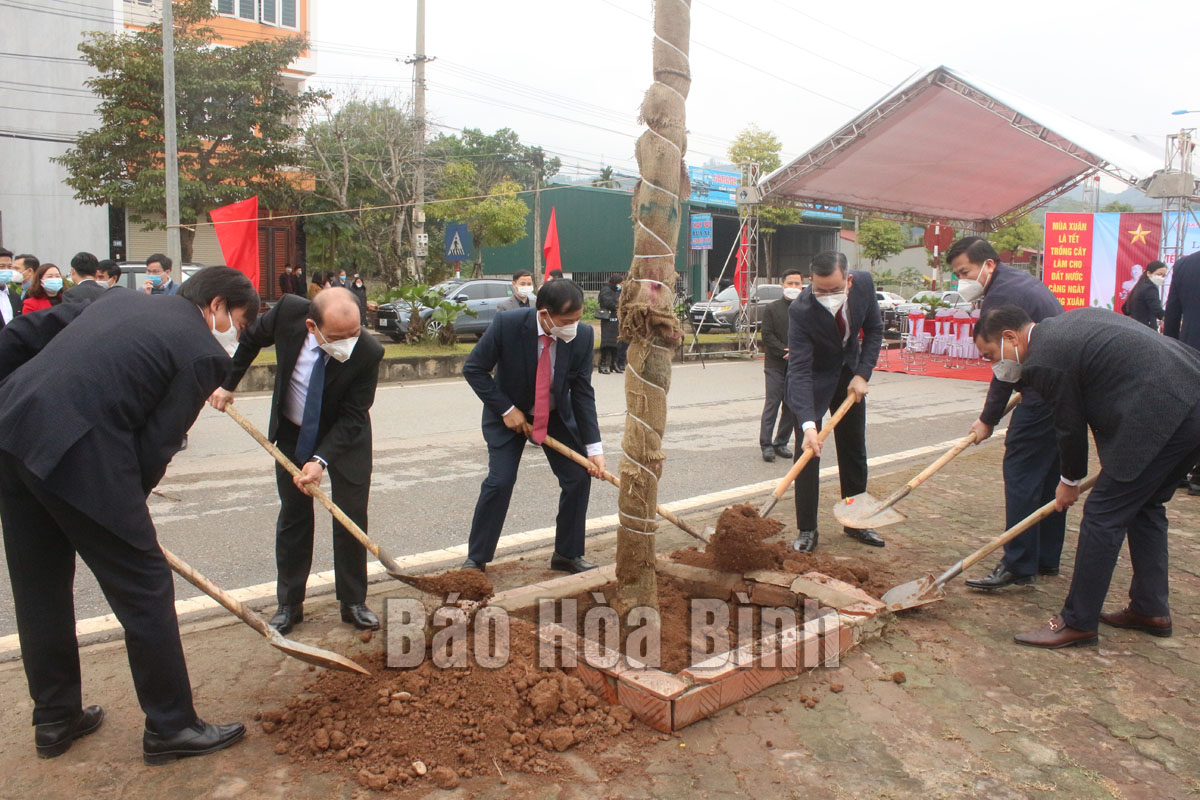
(HBO) - The People’s Committee of Hoa Binh city held a ceremony to launch a tree planting festival on the occasion of the Lunar New Year (Tet) festival on February 7, which fell on the 7th day of the first lunar month.
Attending
the event were Ngo Van Tuan, Secretary of the provincial Party Committee and
head of thedelegation of NA deputies of Hoa Binh; Bui Duc Hinh, Vice
Secretary of the provincial Party Committee and Chairman of the provincial
People’s Council; Bui Van Khanh, Vice Secretary of the provincial Party Committee
and Chairman of the provincial People’s Committee, and representatives from the
Vietnam Fatherland Front’s chapter in Hoa Binh, and the Party Committee,
People’s Council and People’s Committee of Hoa Binh city.
Photo: Representatives from the provincial Party Committee’s standing board,
People's Committee, and the VFF chapter in Hoa Binh are planting trees in Tran
Quy Cap street, Tan Hoa ward, Hoa Binh city.
Implementing Directive No.04/CT-UBND dated January 24, 2022 by the provincial
People's Committee on organising the movement "tree planting in commemoration
of President Ho Chi Minh” on the occasion of the Lunar New Year Festival, the
Hoa Binh municipal People’s Committee planned to organise the festival in the
first working day after Tet. Accordingly, participants joined together to plant 110 trees along Tran Quy Cap
street.
Around nearly 5,000 trees are expected to be planted on the occasion. The movement aims to raise public awareness of the role of forests, forest
protection and development, environmental protection and ecosystem
preservation, contributing to responding to the Government’s programme on
planting one billion trees by 2025./.
Hoa Binh province is undergoing a dynamic transformation amid Vietnam’s national digital transition. Building on Poliburo’s Resolution No. 57-NQ/TW on breakthroughs in science, technology, innovation, and national digital transformation, the province has rolled out a wide range of practical action plans. A standout initiative is the "Digital Literacy for All” movement, an effort to ensure that no one is left behind in the digital era.
Hoa Binh province is undergoing a dynamic transformation in the wake of the national digital transformation movement. Building on Resolution No. 57-NQ/TW of the Politburo on breakthroughs in science, technology, innovation, and national digital transformation, the province has implemented a wide range of practical action plans. A standout initiative is the "Digital Literacy for All” movement ambitious effort to ensure that no one is left behind in the digital age.
With a spirit of unity and proactive problem-solving, the Party Committee, the government and the people of Dong Lai Commune (Tan Lac District) have made great strides in implementing the resolutions of the 24th Party Congress of the commune for the 2020 - 2025 term. Focusing on leadership and practical actions, the commune has brought the Party’s resolutions into daily life, creating strong impacts and pushing the local development forward.
Amid the nationwide push for digital transformation, young people in Hoa Binh Province are stepping up as dynamic pioneers, applying technology to enhance Youth Union operations and expand the reach of youth-led initiatives. Through creativity and adaptability, Youth Union organizations at all levels have introduced a series of practical solutions, contributing to modern governance and community development.
In recent years, An Nghia commune, located in Lac Son district, has stepped up administrative reform, focusing on improving the quality and efficiency of its single-window service unit for receiving and processing administrative procedures. These improvements have helped create favourable conditions for local residents and organisations to handle administrative procedures, contributing to the commune’s broader socio-economic development.
The Prime Minister-approved master plan to develop the multi-use value of forests ecosystems through 2030, with a vision to 2050, aims to improve the management and sustainable use of forest resources, create jobs, increase incomes, and improve the living standards of ethnic minorities, people in mountainous and remote areas, forest workers and those living near forests.



